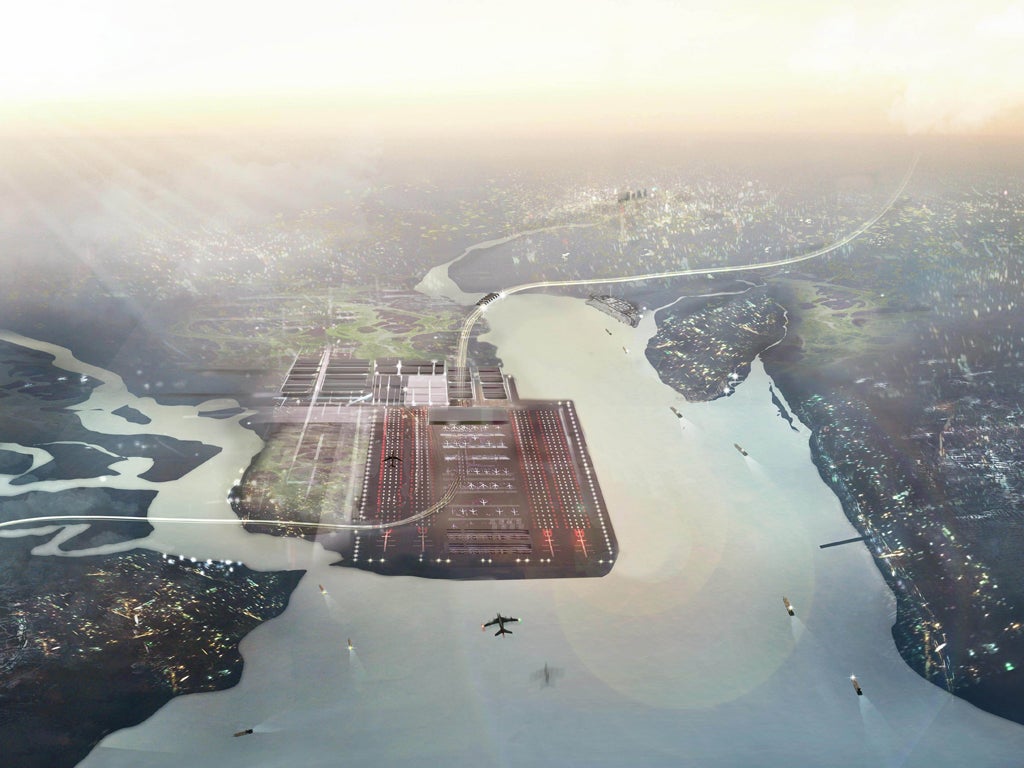Up, up and away! New London airport would need up to £30bn public subsidy
MPs asked if any future owners could make adequate returns sufficient to obtain finance

Your support helps us to tell the story
From reproductive rights to climate change to Big Tech, The Independent is on the ground when the story is developing. Whether it's investigating the financials of Elon Musk's pro-Trump PAC or producing our latest documentary, 'The A Word', which shines a light on the American women fighting for reproductive rights, we know how important it is to parse out the facts from the messaging.
At such a critical moment in US history, we need reporters on the ground. Your donation allows us to keep sending journalists to speak to both sides of the story.
The Independent is trusted by Americans across the entire political spectrum. And unlike many other quality news outlets, we choose not to lock Americans out of our reporting and analysis with paywalls. We believe quality journalism should be available to everyone, paid for by those who can afford it.
Your support makes all the difference.A new hub airport for London would need public subsidy of up to £30 billion, according to new figures published today.
A Commons Transport Committee-commissioned report found that a "substantial" subsidy would be needed.
The MPs wanted to find out if a new hub airport to increase capacity to south east England would be commercially viable for a private investor. They asked if any future owners could make adequate returns sufficient to obtain finance.
Researchers for the economic consultants Oxera found: "Specifically all the scenarios have a negative value at a rate of return that a private investor would require and the analysis implies that substantial public support/subsidy would be needed (in the range of £10-30 billion in today's money for the base-case scenarios examined)."
The report adds that the project could still offer the public good value for money "depending on the scope of the wider benefits that the airport could facilitate".
Different potential situations in which that would have a direct impact on costs were looked into. These included airport design and the number of runways, demand forecasts and construction cost estimates which range across various proposals from £20-£50 billion.
Oxera considered various hub scenarios, rather than any of the actual plans which have been put forward. Researchers did not look in detail at the expansion of existing airports.
The potential impact on Heathrow and other airports were also imagined as this would also have an impact on commercial viability. Compensation to Heathrow needed to be arranged in scenarios where it had to close. Landing charges plus operating costs, all based on current Heathrow usage figures, were also viewed. Policy options towards existing airports was another factor.
The closure of Heathrow was among the potential situations imagined by the researchers which would influence financial viability and demand.
If Heathrow closed, all its traffic would move to the new hub airport. If Heathrow stayed open, the new airport would soak up all unmet traffic and attract some of Heathrow's existing demand.
Forecasts also suggested there could be "a degree of diversion" from London airports to the rest of the UK due to capacity constraints at the London airports.
Researchers also assumed that if there was no capacity constraint at the new hub then the airport could cope with unlimited demand growth.
Transport committee inquiry chairman Louise Ellman said: "The results suggest a new airport would require public investment and have considerable impact on Heathrow and other London airports.
"The research findings also shed significant light on the scale of investment required to deliver essential related surface transport links for any new airport.
"We hope this work delivers something new to a crucial debate."
The MPs are set to use information in their ongoing examination of aviation policy.
The report did not look at whether Government support for a new hub would offer good value for money or to suggest what the overall social and environmental benefits could be.
The Institute of Directors urged a comprehensive overhaul of aviation policy, including the construction of new runways at Heathrow and Gatwick Airports.
Corin Taylor, the IoD's senior economic adviser, said: "This analysis confirms our view that a new hub airport would need substantial public subsidy and probably require the closure of Heathrow.
"Expanding our existing hub airport would be cheaper, quicker and offer far better rail and road connections to the rest of the country."
PA
Join our commenting forum
Join thought-provoking conversations, follow other Independent readers and see their replies
Comments